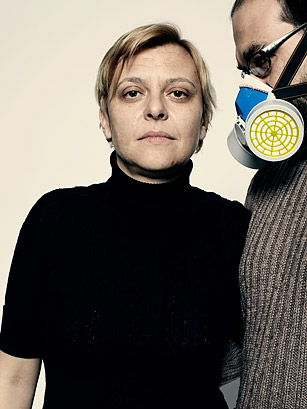
Natalia Klossa, 41, met Antonis, 33, on the second day of the takeover of Athens' Syntagma Square, the central plaza of the Greek capital, which borders on the country's Parliament. They later became a couple. But their involvement in protests hasn't been without cost. Antonis, who used to work for a printing company, did not want his last name published for fear of fascist gangs he says have already attacked him. He covered his face during his photo session with Natalia. He has several moving stories, however, including one about the morning a man in his 60s came to Syntagma Square to see the occupiers. "He burst into tears," Antonis recalls. "He left two euros on our bench, raised a fist and said: 'For a couple of bottles of water.' It was so surprising, so unexpected. Four or five grown men stopped what we were doing and cried like babies." Here is Natalia's account of her experience at the protests — and her relationship with Antonis. Both spoke to TIME's Joanna Kakissis:
I was living a double life with work. I mean, I work at a bank! My job really runs counter to everything I was working for at Syntagma. Banks are in many ways the biggest enemies in the economic crisis. I work in communications in the bank, and I told them I was involved in the Syntagma protests. They knew that when I was leaving work, I was going to the square. I took vacation days to go to the sit-in, and they knew it. They were very reasonable and gave me the freedom to do what I wanted in my spare time, and so I have no complaints. They were also open to listening to me. I think I may have even changed a few minds! Some bank employees and even a few department heads even came to the demonstrations! I realized that sometimes it's good to be "in the system," so to speak, because then you can influence people in it. They trust you, and they're open to talking to you. I'm trying to make the best of this job and also give the best of me to my co-workers, so I can maybe change their minds.
I met Antonis on May 26. We knew each other a long time before we fell in love. I'm rational about feelings, and I didn't want to get involved with someone at Syntagma because our movement was important and I didn't want anything to ruin that. But I loved talking to him. He was so open and excited about everything, and so committed to the cause. We talked about everything and saw that our views really meshed. We'd leave Syntagma together very late and then continue our conversations over a drink. Once, when he got teargassed very badly and was feeling terrible, I told him to come over, and he slept on my couch. I just wanted to keep an eye on him, since he lived by himself. We were very good friends, and then, yes, we fell in love.
I was one of the people who wanted to do something about the state of our country long before the Syntagma Square protests. Despite appearances at protests, most Greeks don't get out and demonstrate or complain, at least in a public, organized way. When the Syntagma sit-in was first organized and I saw so many people, I thought, wow, there's hope for Greece. I thought that after so many years, here was a big gathering of Greeks that had nothing to do with political parties or the Polytechnio [the anti-junta uprising on Nov. 17, 1973]. I had tears in my eyes when I saw so many people with the aganaktismenoi [Greek for indignants]. I was so moved. I got onto Twitter and started getting organized with them. We started talking, and I loved participating in it.
As altruistic as we say we are, I don't think people get involved in protest movements only for altruistic reasons. That is simply human nature. If it doesn't mean something for us personally, if we're not trying to change something for ourselves personally, then it is hard to invest so much time in it. Also, if it doesn't mean something to you personally — if you don't believe in your heart that you are doing it to change something — then you're not going to do anything.